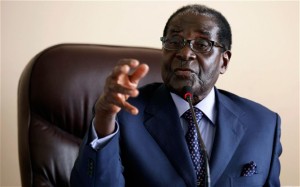Source: EDITORIAL COMMENT: Zimbabwe cannot afford false dawn | The Financial Gazette November 23, 2017

Former president Robert Mugabe
ROBERT Mugabe, the man who dominated Zimbabwe’s political and economic life for four decades, will now be confined to its history.
Mugabe’s forced resignation on Tuesday, under duress from the military and his party, drew to a close an era which started with so much promise but ended in tragic circumstances.
He exits the scene, leaving a deeply polarised country that has long lost its proud position among the community of nations and wracked by extreme poverty.
That it ultimately took the coercive force of the military to push Mugabe to hand over power also highlights the extent of the decay that had set into the state, actively promoted by the now ousted veteran ruler.
Mugabe’s exit, widely welcomed and wildly celebrated in scenes reminiscent of the joy of independence in 1980, comes at a huge price.
The brazen military intervention into our civilian affairs, which eventually brought Mugabe to his knees, is a genie most countries let out of the bottle but fail to put back in.
As we look forward with cautious optimism, we hope the new administration, expected to be led by former Vice President Emmerson Mnangagwa, will avoid the grievous mistakes of successive Mugabe governments, which the presumptive heir was part of.
We hope the new government will give urgent attention to political and economic reforms needed to arrest Zimbabwe’s slide into a dystopian nightmare.
Mnangagwa has so far made the right noises and we hope his administration and party, reconfigured after the convulsions of the past week, follow through on these promises.
As Mnangagwa himself indicated in his 2015 interview with Chinese state television, Zimbabwe has fallen back 20 years in industrial and overall economic development.
A student of China, Mnangagwa will no doubt be familiar with the far-reaching reforms instituted nearly 40 years ago by Deng Xiaoping, setting the vast communist nation on a firm capitalist path.
Like Deng, Mnangagwa needs to prioritise fixing our broken agriculture the bedrock of our economy while aggressively opening the economy up for investment and actively promoting local entrepreneurship.
Urgent attention also needs to be given to state-owned enterprises, which continue to under perform and drain the fiscus.
Zimbabwe’s infrastructure deficit, estimated at US$15 billion, presents a huge investment opportunity for the country.
There are low hanging fruits, such as tourism. Zimbabwe boasts of several world-class attractions, which require a change of international sentiment more than new investment to make our tourism sector a multi-billion dollar industry.
Functional financial infrastructure is absolutely crucial for this to happen.
On the statutory front, we hope the new government moves with speed to repeal the indigenisation law, which has delivered very little by way of actual local ownership of business, but has acted as a scarecrow to foreign investment.
Similarly, amendments to mining legislation need to be finalised, to provide clarity to a key industry that can quickly unlock significant capital.
Clearly, the incoming government has its work cut out. But the beauty of Zimbabwe’s disastrous recent history is that profound lessons can be drawn on how not to run an economy.
It is absolutely vital that past bad habits are not replicated, because Zimbabwe can ill afford a false dawn.
COMMENTS